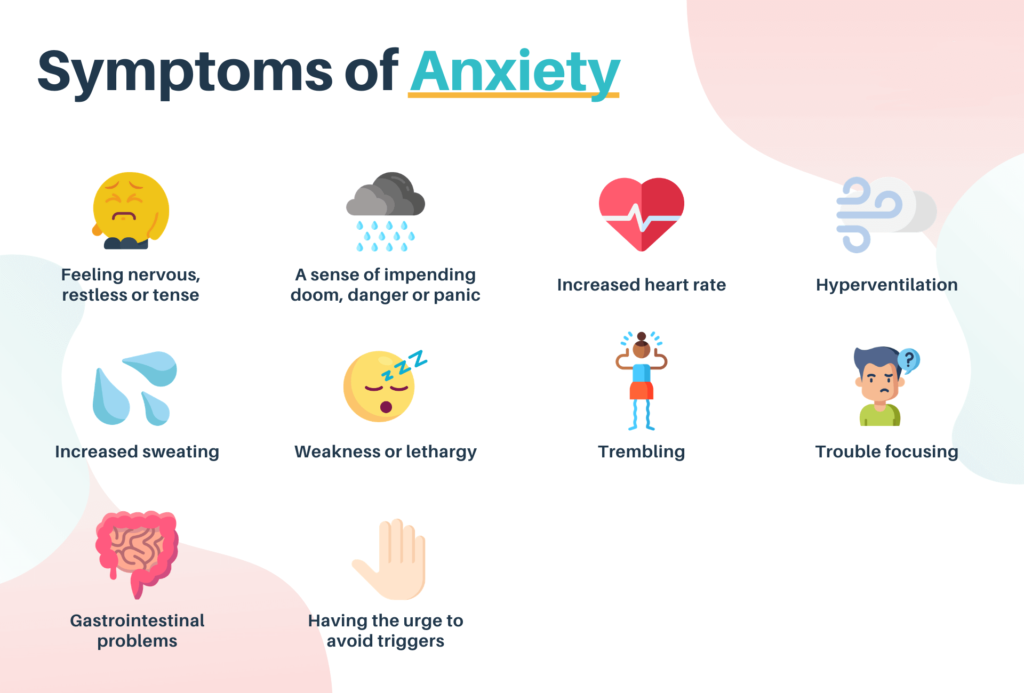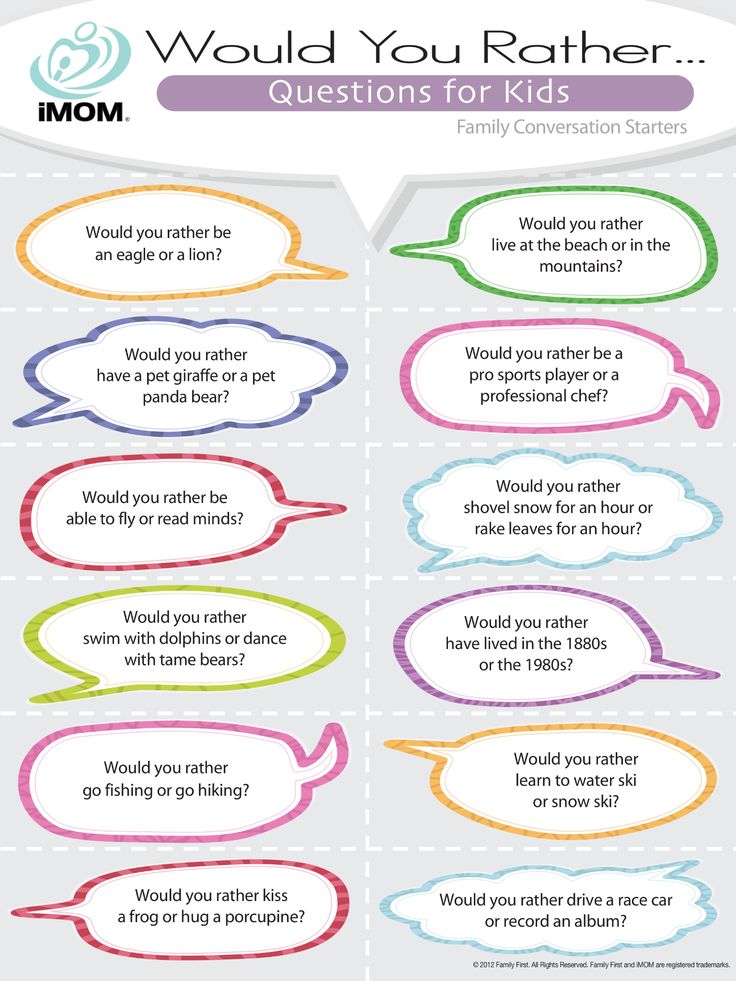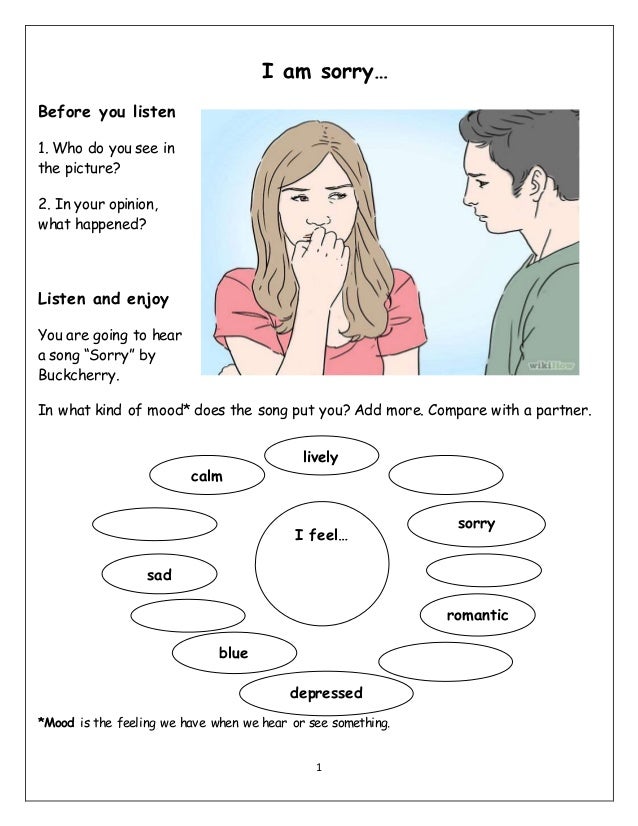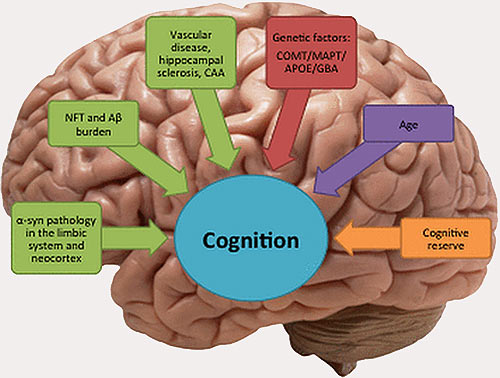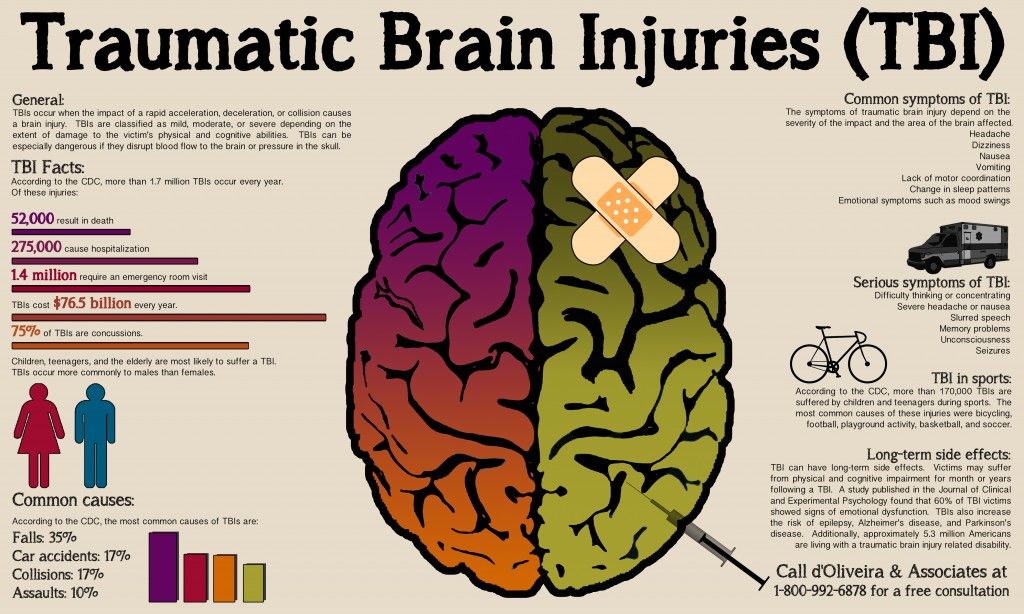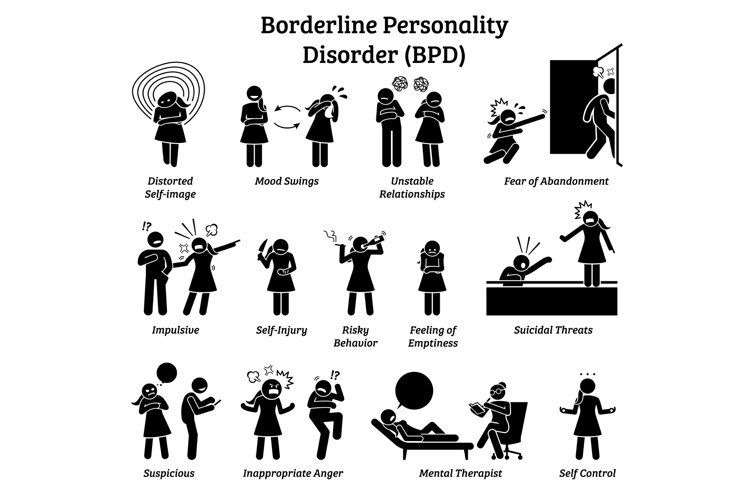How to stop overthinking at night
How to Stop Overthinking at Night
Our brains love to kick themselves into overdrive at the most inopportune of moments. For you, it may be when you crawl into your toasty bed, exhausted from a long and hard day. But, try as you might, you simply can’t shut your brain off. All manner of thoughts are darting around it, and you simply can’t shake them. The end result is sleeping far later than you wanted to, and this means you wake up feeling tired and groggy. Thankfully, learning how to stop overthinking at night isn’t that difficult. I am going to share with you a few tried and tested techniques which will help you to shut your brain off at night. Put these into action, and you will be sleeping well before you know it.
Why do we overthink at night?
Before we talk about how we can tackle all that overthinking, I think it is worth taking a little bit of time to talk about why it is happening in the first place. I think this will help you to realize that overthinking is actually fairly normal. It is something that everybody will deal with at some point or another.
The brain is an information processing machine. Each and every day, a load of information is being thrown at you. Information that your brain needs to process at some point. The problem is that our lifestyles are busier than ever before. There is very little downtime, which means that your brain never really gets a rest from that constant barrage of information. The only time it can ‘take a break’ is when you are laying in bed of an evening. So, when you are overthinking, you will find that your brain is (mostly) processing information. Storing it. Making decisions etc.
Honestly, you will find that having a little bit of quiet time to yourself each day will do wonders when it comes to overthinking. Give yourself a rest every few hours, and the amount that you overthink of an evening will shoot all the way down. Which leads us neatly onto our first method for how to stop overthinking at night.
7 ways to stop overthinking at night
1.
 Meditate before bed
Meditate before bed Perhaps the best way to decompress is to try a bit of meditation. If you have never meditated before, don’t worry, it is actually pretty easy. All you need is a quiet room and a soft chair to sit on. You may want to light a candle or two for some atmosphere. Then just follow these steps:
- Close your eyes and relax them. Take a few deep breaths to get started.
- If you have never meditated before, it can be difficult to breathe deeply. You will start warming up to it, though. Breathe in through your nose and out through your mouth. Focus on making your breaths as deep as you can. You will get the hang of it after a while.
- The key to meditation is to focus on your breathing. Focus on nothing else. Just focus on the air going in and then coming back out. This will eliminate any thoughts lingering in your mind.
That really is it. If you meditate for just five minutes, you will feel so much more relaxed. However, the feeling is so fantastic, that I reckon you will be doing it for at least 10-20 minutes, even at the start. Try our guided meditation for overthinking if you’re looking for a place to start.
Try our guided meditation for overthinking if you’re looking for a place to start.
If you are struggling to relax, you may want to listen to some music designed specifically for meditation. It will help to get you in the mood.
Free meditation appDeclutter The Mind is an app that will teach you how to meditate, help you form the habit of a regular practice, and expand your mind to the teachings of mindfulness.
Download App
2. Have a wind down routine
About an hour before you head to bed, give yourself time to ‘decompress’. Don’t watch television, it is going to stimulate your brain further. Disconnect from your phone and tablets, avoid blue light that keeps you up, and give yourself a few hours before bed to prepare for sleep. You can probably read a book, but make sure that the subject matter isn’t too heavy. The last thing you want is to be thinking about that awesome plot line when you are trying to drift into the land of dreams.
To stop overthinking at night, we need to avoid stimulating ourselves around bedtime.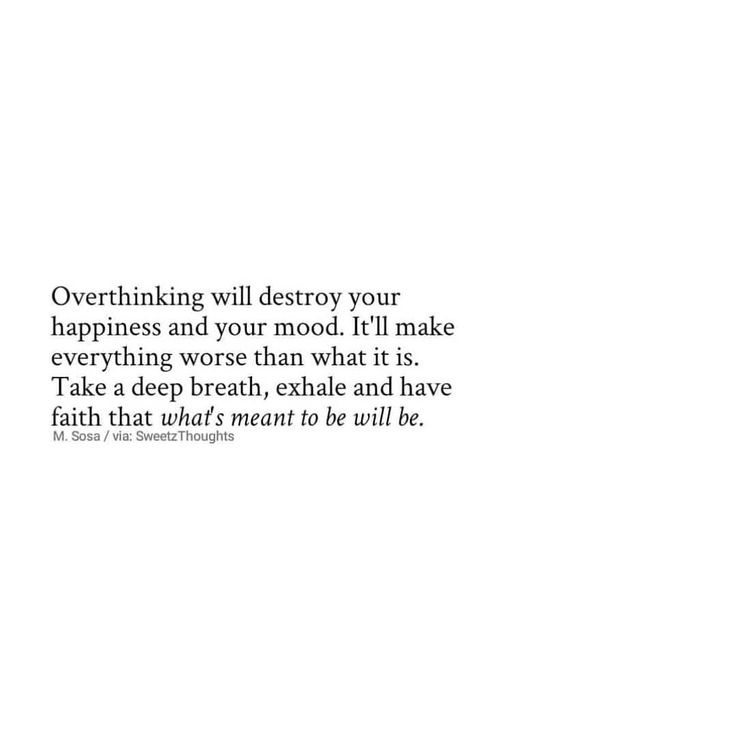 Sleep experts agree that about an hour or two before you plan to fall asleep, is best. A good night’s sleep is all about preparing your body and mind for it. Often our racing mind and staying awake from thoughts comes from trying to fall asleep right after doing something stimulating such as watching tv or reading an intense book.
Sleep experts agree that about an hour or two before you plan to fall asleep, is best. A good night’s sleep is all about preparing your body and mind for it. Often our racing mind and staying awake from thoughts comes from trying to fall asleep right after doing something stimulating such as watching tv or reading an intense book.
This will also help encourage you to go to bed early. Often, we find ourselves getting into something late at night, and it disrupts our sleep schedule and we go to bed later than usual. This pattern only serves to disrupt restful sleep and keep us awake.
3. Invoke more positive thoughts and thinking
Another good thing to consider and help quiet the overthinking mind at night is to move yourself to more positive thoughts and thinking. One suggestion is to have a gratitude list. This is a list of things you’re grateful for that you go through before bed to start moving towards more positing thinking and focus on the more positive things in life instead of unwanted thoughts.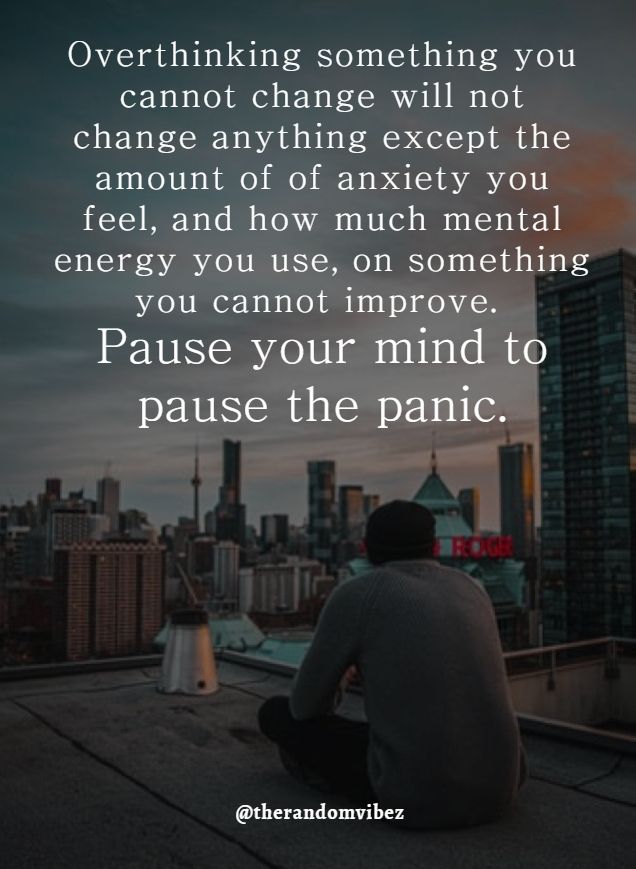
Now, when you go to bed thinking, you won’t be filled with thinking about the busy day tomorrow or spend all night in your own personal worry time. Now, you’ll move from racing thoughts to a happier, more relaxed mind at night.
4. Talk about your feelings
If you have a lot of anxiety or burning thoughts on your mind, then talk about them to a friend or loved one. Talk about your day, and any issues that you had with it. Make them feel as if they can talk to you if you want. In most cases, an open and honest discussion like this is more than enough to ensure that you get a good night of rest.
Sometimes laying in bed at night or the only time our mind has a chance to “vent” or process the day because it’s the only time you find some peace and quiet. So instead, give yourself room during the day to talk about your worries, and find a friend or loved one interested in listening.
If you don’t have anybody to talk about your feelings too, then you may want to buy a notebook and jot a few of your inner thoughts down into it.
5. Distract your brain
There will be some evenings where you won’t be able to shake your thoughts at all. If you want to stop overthinking at night and you follow the techniques mentioned before, these evenings will be minimal, but they will still happen. Sometimes, the best you can hope for is to distract your brain with something a bit more positive.
When I get anxiety-laden thoughts of an evening, there is one method that works really well for me. This is making up a story. When you feel those negative thoughts start to creep into your brain, come up with a story, When I was a kid, I used to love making up stories about my ‘dreams’. For example; I wanted to be a professional football player, so I would imagine myself doing that. Although, you may want to do something different. Just think about something ‘fun’.
If you can’t do that, then some people find that making lists up in their mind about what needs to be accomplished the next day is a good distraction. Although, you may find that doing this will cause you to overthink more, so proceed with caution! If you don’t want to make a ‘to do’ list, then try and make a random ‘fun’ list up. For example; make a list of your favorite movies or songs. Just something to focus your mind elsewhere. You could also use the ‘tried and tested’ method of counting sheep. You will be asleep before you know it.
Although, you may find that doing this will cause you to overthink more, so proceed with caution! If you don’t want to make a ‘to do’ list, then try and make a random ‘fun’ list up. For example; make a list of your favorite movies or songs. Just something to focus your mind elsewhere. You could also use the ‘tried and tested’ method of counting sheep. You will be asleep before you know it.
6. Be more physically active
The final technique will require you to have a few hours free throughout your day, particularly in the run up to sleeping. If you exercise and tire yourself out, your body simply will not have the energy to ‘overthink’. You are going to be drifting into that slumber before you know it. That being said, this is a technique which is probably best used in combination with one of the others on this page. While it is a tremendous method for how to stop overthinking at night, there are some thoughts that will be so powerful and so overwhelming that being dead tired is not enough. Your brain will still somehow manage to muster up the energy to think about your problems.
Your brain will still somehow manage to muster up the energy to think about your problems.
7. Seek professional medical advice
When it seems like nothing else is working, it may be time to seek professional medical advice in case you’re suffering from something more serious such as insomnia. Treatment will vary from sleep medicine, to improving sleep hygiene, to sleeping pills.
The treatment isn’t always a pill either. Treatments such as cognitive behavioural therapy can go a long way into treating sleep problems and getting you to a place where you’re falling asleep quickly on most nights.
Sleep Easier Tonight
If you follow these techniques, you will lower the amount of overthinking you do, if not eliminating it completely. You will be surprised at how many daily issues a spot of meditation in the evening can help you to deal with. However, do remember that if you have a ton of anxious thoughts at night that you can’t shake no matter what you try, you may want to talk to your doctor or psychologist. They will be able to provide you with further advice.
They will be able to provide you with further advice.
Can’t sleep? How thought blocking can help
Key points
Our daily worries can often creep into our thoughts at night-time and this can seriously disturb our sleep. In this article we’re going to explore ways to calm your weary mind, how to stop overthinking and banish unwanted thoughts from your sleeptime. We’ll cover:
- why shutting out your thoughts and feelings is not a good strategy
- techniques that can help to quieten a racing mind
- how to stop intrusive thoughts at night
- how Cognitive Behavioural Therapy for insomnia (CBTi) equips you to deal with sleep-intruding scenarios.
Introduction
Modern life isn’t easy, with concerns about money, housing, work, relationships and living a “successful” life being frequently reported as sources of worry for many people.
Sometimes our worries can have a real impact. We can’t sleep, overthinking about every little thing.
Frequently, people living with stress, anxiety, depression and insomnia will say that racing, intrusive (unwanted) thoughts make it harder for them to get to sleep than any sort of physical discomfort or pain.1
Insomnia and overthinking often go hand-in-hand. So people with insomnia will commonly try to shut out thoughts that are stopping them from sleeping. This might sound sensible at first, but it can cause more problems than it solves.23
By implementing better ways to deal with intrusive thoughts, the time between getting into bed and falling asleep needn’t be so difficult. You may also find it easier to fall back to sleep if your sleep isn’t interrupted by racing, intrusive thoughts.
There are a number of thought blocking strategies that have been studied for dealing with these intrusive thoughts in the context of insomnia. Many will be covered in a course of CBT for insomnia (CBTi).456
The core of these strategies is that they enable a person to substitute thoughts that might keep them awake (arousing thoughts) with non-arousing thoughts. This should:
This should:
- reduce the time it takes to fall asleep (the sleep onset time)
- help you to stop overthinking
- increase sleep quality.
We’ll go over a few of these strategies here, in the hope that they’re useful to you or someone you know.
We’ll work with you to get to the root of what’s keeping you awake. Sleepstation is:
supported by sleep coaches
individually tailored to you
delivered entirely online
more effective than medication
clinically proven and accredited by the NHS
Going beyond counting sheep: what to do with unwanted thoughts?
Repeat a word or do a mental puzzle
One of the early, but effective solutions to overthinking and intrusive thoughts in bed is called “articulatory suppression,” in which you would mouth a word at a rate that makes thinking about any other thought difficult ― usually 3 to 4 times a second.
The underlying psychology is complex, but the theory is that mouthing a word requires a lot more mental power than just thinking it and the use of that mental power causes a blocking of the original intrusive thought. Choices of word for this method include:
- the word “the”2
- a nonsense syllable (such as pah, oop, vee.. the choices are endless!)
- a proper name (e.g. Paris, April, Jaffa Cake).
The only requirement is that it has no emotional significance to you (i.e. is non-arousing). You can also extend the technique by:
- accompanying the word you use with a visualisation of a shape, like a triangle or square. This is particularly useful if your intrusive thoughts have a visual component.7
- adding a puzzle element, such as counting back from 1000 in certain “jumps” e.g. 1000, 993, 986, using “jumps” of 7 in addition to using a word, image or syllable.

Since everyone is different, it might take a few goes to find a process which works for you.
Distract yourself
“Imagery distraction” is a helpful technique when you can’t sleep, where you imagine yourself in an engaging and interesting scenario like:
- a relaxing holiday
- cooking a meal or
- a nice, sunny afternoon in the garden.
Although there’s less evidence to suggest imagining a scenario reduces how long it takes to get to sleep compared to articulatory suppression, using mental imagery has been reported to increase the quality of sleep once a person is asleep.89
Once you’ve chosen your scenario, the aim is to immerse yourself in it as deeply as possible by imagining all the sights, sounds, smells and ultimately relaxation that comes with it, so that it becomes impossible to think of anything else.
It’s important to avoid scenarios that are too arousing, like a sporting event or sexual encounter, because these scenarios are unlikely to be relaxing andso will make you feel more awake rather than helping you get to, and stay asleep.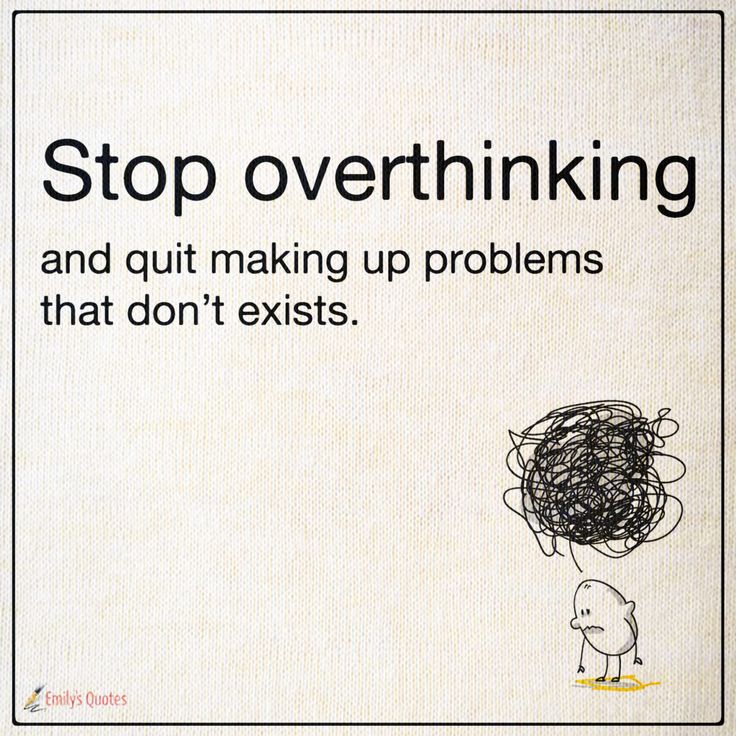
Be grateful
Since negative thoughts are often cognitively arousing, fixating on them can make insomnia worse. It’s interesting to note that:
- in one study, subjects who were asked to focus on their regrets at bedtime took longer to get to sleep than those that did not.10
- in another study, participants with insomnia experienced sleep benefits when they focussed on positive thoughts and things they were grateful for at bedtime.911
Going over the good things in life may be more difficult for some people than others, such as those with depression12 or anxiety. Specialised treatment should be sought for these conditions.
Accept your thoughts
As strange as it sounds, not doing anything about your intrusive thoughts can be a surprisingly effective strategy to deal with them.
Here, the key is simply to accept that you aren’t able to sleep because of overthinking or intrusive thoughts. By not worrying about the implications, or trying to fight your own thoughts, their impact is dulled which means they’re less liable to be arousing and to keep you awake.2
By not worrying about the implications, or trying to fight your own thoughts, their impact is dulled which means they’re less liable to be arousing and to keep you awake.2
CBTi can help you take control of your thoughts
These strategies, while effective on their own, are even more effective as part of a structured CBTi programme.5 If you’ve tried multiple techniques and nothing has worked you may need support from an expert sleep team.
At Sleepstation, we developed a digital CBTi programme which has been clinically-validated and is highly effective at resolving insomnia. We’ve helped thousands of people to take back control of their sleep and our results speak for themselves.
So if you can’t sleep at night due to overthinking, our sleep improvement programme can help you optimise your sleep for better health. Get started today.
Summary
- If overthinking or intrusive thoughts are stopping you from sleeping, there’s a range of techniques you can try to clear your mind.
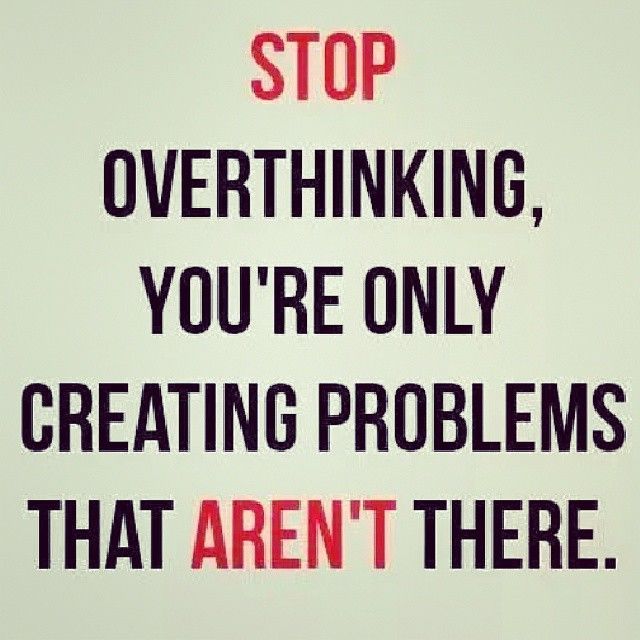
- You could try repeating a word (articulatory suppression), doing a mental puzzle or distracting yourself (articulatory suppression).
- If you’ve tried all of the above options and nothing is working, Sleepstation’s CBTi programme may be able to help you.
References
-
Harvey AG. I Can’t Sleep, My Mind Is Racing! An Investigation of Strategies of Thought Control in Insomnia. Behav Cogn Psychother. 2001 Jan;29(1):3–11.
↑ -
Espie CA. Overcoming Insomnia: A Self-Help Guide Using Cognitive Behavioural Therapy. London, UK: Robinson; 2006.
↑ -
Schmidt RE, Harvey AG, Van der Linden M. Cognitive and Affective Control in Insomnia. Front Psychol 2011;2:349.
↑ -
Gellis LA, Park A.
↑ Nighttime Thought Control Strategies and Insomnia Severity. Cogn Ther Res 2013 Apr;37(2):383–9.
Nighttime Thought Control Strategies and Insomnia Severity. Cogn Ther Res 2013 Apr;37(2):383–9. -
Harvey L, Inglis SJ, Espie CA. Insomniacs’ reported use of CBT components and relationship to long-term clinical outcome. Behav Res Ther 2002;40:75–83.
↑ -
Trockel M, Manber R, Chang V, Thurston A, Taylor CB. An e-mail delivered CBT for sleep-health program for college students: effects on sleep quality and depression symptoms. J Clin Sleep Med 2011 Jun 15;7(3):276–81.
↑ -
Levey AB, Aldaz JA, Watts FN, Coyle K. Articulatory suppression and the treatment of insomnia. Behav Res Ther 1991;29:85–9.
↑ -
Harvey AG, Payne S.
↑ The management of unwanted pre-sleep thoughts in insomnia: distraction with imagery versus general distraction. Behav Res Ther 2002;40:267–77.
The management of unwanted pre-sleep thoughts in insomnia: distraction with imagery versus general distraction. Behav Res Ther 2002;40:267–77. -
Digdon N, Koble A. Effects of constructive worry, imagery distraction, and gratitude interventions on sleep quality: A pilot trial: Effects of interventions on sleep quality. Appl Psychol Health Well Being 2011;3:193–206.
↑ -
Schmidt RE, Van der Linden M. Feeling Too Regretful to Fall Asleep: Experimental Activation of Regret Delays Sleep Onset. Cogn Ther Res 2013 Aug;37(4):872–80.
↑ -
Wood AM, Joseph S, Lloyd J, Atkins S. Gratitude influences sleep through the mechanism of pre-sleep cognitions. J Psychosom Res 2009 Jan;66(1):43–8.
↑ -
Malmberg M, Larsen JK.
↑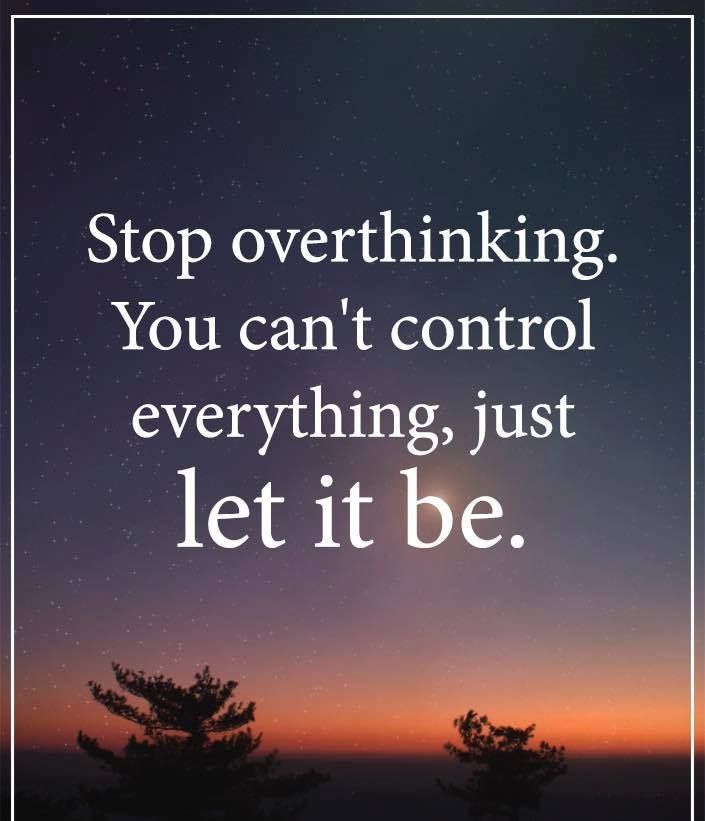 Depressive Symptoms: The Interaction between Rumination and Self-Reported Insomnia. Depress Res Treat 2015;2015:1–4.
Depressive Symptoms: The Interaction between Rumination and Self-Reported Insomnia. Depress Res Treat 2015;2015:1–4.
How to stop worrying and start sleeping?
How to stop worrying and start sleeping?
JavaScript seems to be disabled in your browser.
You must have JavaScript enabled in your browser to utilize the functionality of this website.
Our brands
Our stores
Select category
- Matraits
- Toppers
- Pillows
- Blankets
- Accessories
- Promotions
Search:
Our stores
with Club 5*
Sign in
0.00 ΓPΗ
Losd fsdf sd
Your shopping cart is empty.
It happens that people cannot fall asleep because of the habit of constantly being on the alert.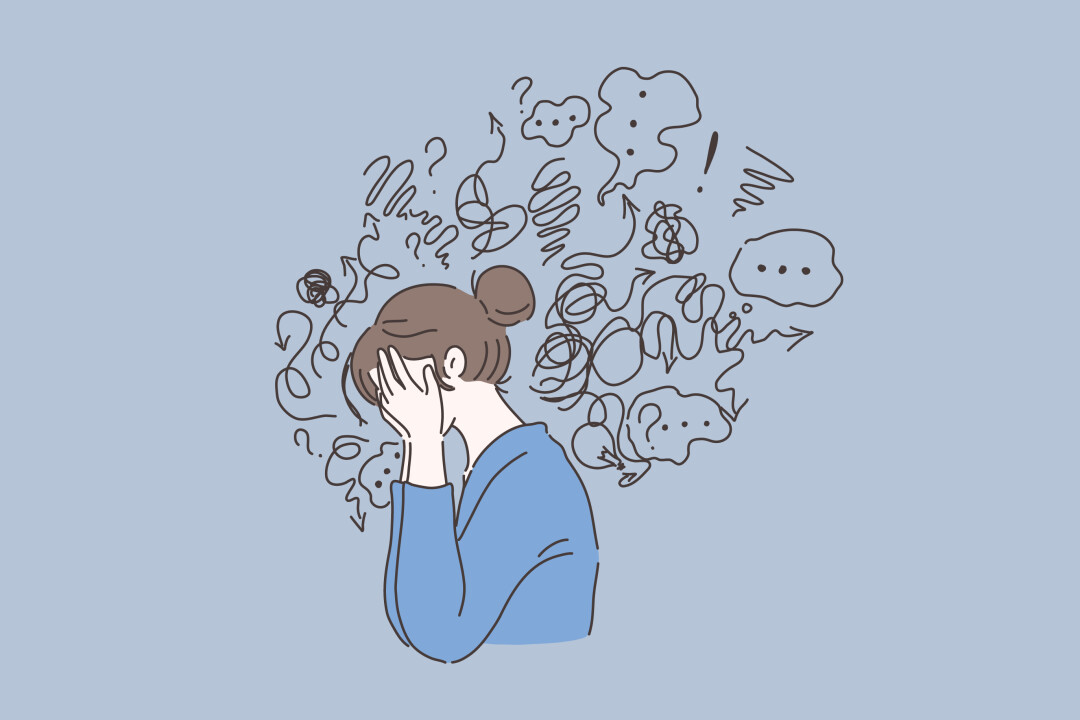 Those who have moved to a new apartment, or, for example, young parents, may encounter such a condition - your baby has already grown up and sleeps sweetly until the morning, but you seem to have completely forgotten how. The most unpleasant thing is that realizing that the morning is approaching, you panic more and more. How to establish the correct mode? Knowledge of psychology will help you!
Those who have moved to a new apartment, or, for example, young parents, may encounter such a condition - your baby has already grown up and sleeps sweetly until the morning, but you seem to have completely forgotten how. The most unpleasant thing is that realizing that the morning is approaching, you panic more and more. How to establish the correct mode? Knowledge of psychology will help you!
It happens that people cannot fall asleep because of the habit of constantly being on the alert. Those who have moved to a new apartment, or, for example, young parents, may encounter such a condition - your baby has already grown up and sleeps sweetly until the morning, but you seem to have completely forgotten how. The most unpleasant thing is that realizing that the morning is approaching, you panic more and more. How to establish the correct mode? Knowledge of psychology will help you!
6 simple rules to make falling asleep easier:
- No stimulants before bed - such as caffeine, smoking and junk food!
- Comfortable conditions - comfortable mattress, optimal temperature in the room, darkness and silence if possible
- Things that help you relax, such as daily meditation or yoga
- Don't go to bed until you feel sleepy
- Staying up too long
- No sleep during the day
And this, of course, is not all - after all, the main list of recommendations can be supplemented.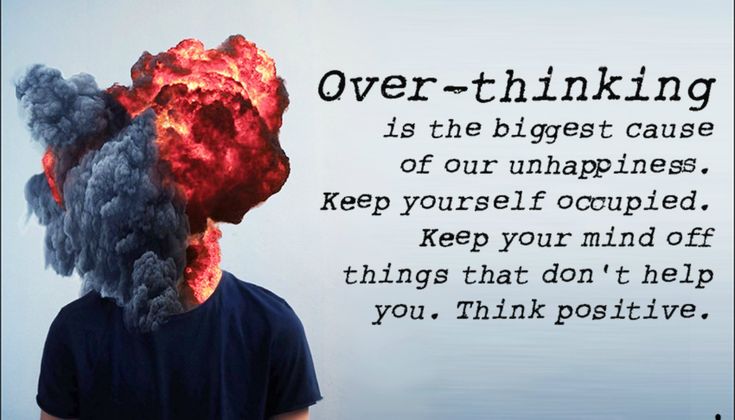
Useful tricks and subtleties:
- If you are unable to sleep, get up and do your preselected boring activity for at least 20 minutes. This will help you switch. Just keep in mind, reading in bed will not work.
- No "sleep crutches" such as alcohol or sleeping pills! This is important because nothing should undermine your belief in your own natural sleep mechanism. In addition, artificial remedies usually help for a short time - and the rest of the night you just toss and turn and feel absent-minded the next day.
- Do not rely too much on pills, otherwise they can become an integral part of your life.
- Don't complain about your sleep to anyone. This can also affect your belief in your own ability to sleep well. Psychologists are sure that what you tell about your dream comes true. Better program yourself with statements like "I usually sleep very well.
 " In time this will become true.
" In time this will become true. - Do not look for excuses and try not to compromise about the regime - for example, do not stay overnight at a party if this can adversely affect the quality of your sleep.
- Don't look at your watch at night . This can make you panic even more. What matters to you is how well you feel the next day, not the number of hours you spent sleeping.
- If you often start to worry while lying in bed, find something that calms you . For example, think about the weekend coming up. Or that your spouse will always come to your rescue if you feel a catastrophic lack of sleep the next day.
Back to articles
\x3c!--\x3e\x3c!--How to stop thinking about work at night and become more productive during the day
In the evening make a list of tasks for the next day
Keep a diary
Don’t blame yourself for mistakes, feel sorry for yourself
Exercise
Meditate
Meditate
1 in the evening next day Studies show that if you make a plan for tomorrow before going to bed, you will fall asleep sooner - the effect is comparable to the effect of sleeping pills. Also after that you will wake up less at night. The reason is that tasks that are not completed during the day cause the brain to remain in an excited state, and writing them down reduces arousal.
Also after that you will wake up less at night. The reason is that tasks that are not completed during the day cause the brain to remain in an excited state, and writing them down reduces arousal.
And if you still woke up at night and remembered some business that you had forgotten about, write it down and go back to sleep.
Keep a diary
This is not a very popular activity now, but in vain. Instead of keeping thoughts and feelings only in your head, writing them down can help reduce stress and anxiety, because with this simple exercise, we can think about and experience them more. At the same time, it is necessary to write down the positive that happened during the day.
Don't reproach yourself for mistakes, feel sorry for yourself
You should treat yourself the same way you would treat a good friend. If something happened to him, you would probably try to calm him down, cheer him up, convince him that not everything is so bad and that everyone can make a mistake. Research shows that this kind of self-awareness can help overcome stress-related sleep problems.
Research shows that this kind of self-awareness can help overcome stress-related sleep problems.
Get some exercise
One set of moderate activity exercise helps you sleep better at night. 30 minutes of outdoor sports improve the quality of sleep and make you fall asleep faster. But still, there are people for whom physical activity before bedtime interferes with sleep, so if you are one of them, do exercises 1-2 hours before you go to bed.
Meditate
Meditation is concentration on one's own feelings, thoughts, bodily sensations. It helps to clear the brain of thoughts that may haunt it at a time when it is necessary to sleep. The positive effects of meditation on anxiety and stress are also supported by scientific evidence. Scientists from the Netherlands found that 10 minutes of meditation before work and 10 minutes after work for two weeks calms the flow of thoughts, improves the quality and duration of sleep.
